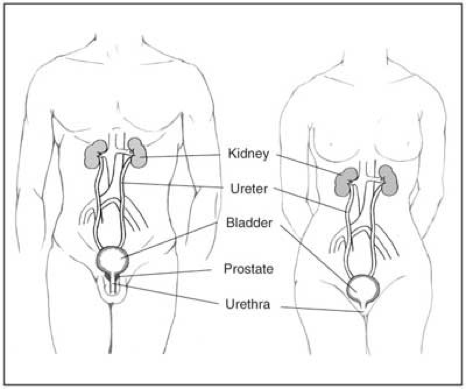
(Reprinted with permission from the National Institute of Diabetes and Digestive and Kidney Diseases, National Institutes of Health.)
The Kidneys
The kidneys are two reddish-brown, bean-shaped organs located just above the waist. One kidney is just to the left and the other just to the right of the backbone. Both are protected by the lower ribcage. The kidneys do not re-grow like the liver does. When kidney tissue is lost, which can happen in surgery, kidney function decreases. In addition, adults lose kidney function as they age.
The kidneys' main job is to filter the blood and rid the body of excess water, salt and waste products. The filtered waste products are concentrated into urine. Urine passes from the kidneys into the bladder through two tubes called ureters. Urine leaves the bladder through another tube called the urethra.
Kidney Cancer
Several types of cancer can develop in the kidney. Renal cell cancer is the most common type of kidney cancer. It occurs more often in men than in women.
Like all cancers, renal cell cancer begins small and grows larger over time. Although renal cell cancer usually grows as a single mass, a kidney may contain more than one tumor. Tumors may also be found in both kidneys at the same time. Some renal cell cancers are noticed only after they have become quite large, but most are found before they metastasize (spread) to other organs through the bloodstream or lymph vessels.
Transitional cell cancer, which affects the lining of the renal pelvis, is a less common form of kidney cancer. It is similar to cancer that occurs in the lining of the bladder and is often treated like bladder cancer.
Treatment for Kidney Cancer at MD Anderson Cooper
Different types of treatment are available for kidney cancer. Some treatments are standard – the currently used treatment – and some are being tested in clinical trials. Before starting treatment, patients may want to think about taking part in a clinical trial.
A treatment clinical trial is a research study meant to help improve current treatments or obtain information on new treatments for patients with cancer. When clinical trials show that a new treatment is better than the standard treatment, the new treatment may become the standard treatment.
Choosing the most appropriate cancer treatment is a decision that ideally involves the patient, family and health care team.
Five Types of Standard Treatment
There are five types of standard treatment for kidney cancer.
Surgery to treat kidney cancer is called nephrectomy. Depending on the tumor size, location and stage, the surgeon may choose to remove the entire kidney (radical nephrectomy) or just the portion affected by cancer (partial nephrectomy). If surgery is your best treatment option, your doctor will discuss the procedure with you.
Radiation treatment uses high-energy X-rays or other types of radiation to kill cancer cells or keep them from growing. Radiation has a limited role in treating kidney cancer. Kidney tumors often do not shrink or stop growing when treated with radiation, so this as a frontline treatment is usually not advised. In some cases, radiation may be used to ease pain and other symptoms of advanced kidney cancer that has spread to bone or other areas of the body.
Chemotherapy is usually not an effective treatment for kidney tumors, but is sometimes used to treat tumors that have spread to the lung, bones, brain or lymph nodes. In these cases, chemotherapy would be combined with surgery or another type of treatment.
Immunotherapy (sometimes called biologic therapy) is a treatment that uses the patient’s immune system to fight cancer. Substances made by the body or made in a laboratory are used to boost, direct or restore the body’s natural defenses against cancer.
Targeted therapy uses drugs or other substances that can find and attack specific cancer cells without harming normal cells. Antiangiogenic agents are a type of targeted therapy now frequently used to treat advanced kidney cancer. They keep blood vessels from forming in a tumor, causing it to starve and stop growing or to shrink.
New types of treatment are tested in clinical trials. Ask your doctor if a clinical trial is available for your type of cancer.
